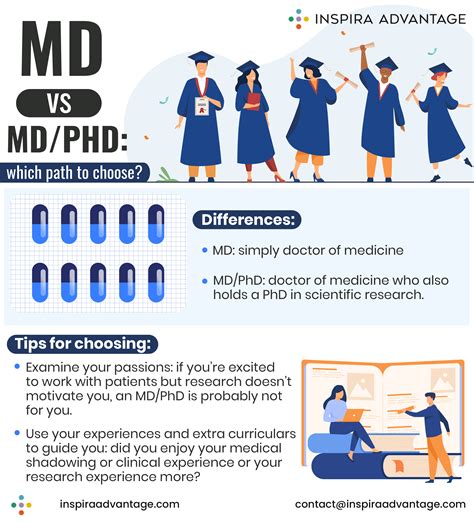In the realm of healthcare, two prominent designations emerge: MD (Doctor of Medicine) and PhD (Doctor of Philosophy). Each path offers unique opportunities, career prospects, and distinct approaches to the field of medicine. Understanding the MD vs. PhD difference empowers individuals to make informed decisions about their academic and professional pursuits.

Defining MD and PhD Degrees
MD (Doctor of Medicine)
- Professional degree focused on clinical practice
- Prepares individuals to diagnose, treat, and manage patient care
- Requires completion of medical school and residency training
PhD (Doctor of Philosophy)
- Research-oriented degree emphasizing original research and scholarship
- Qualifies individuals to conduct independent scientific investigations
- Typically requires completion of doctoral coursework, research, and a dissertation
Educational Pathways and Career Options
MD Pathway
- Pre-medical coursework in undergraduate studies (e.g., biology, chemistry, physics)
- Medical school admission and completion of a 4-year program
- Residency training in a medical specialty (e.g., internal medicine, surgery)
- Career options include practicing physician, hospitalist, clinic manager
PhD Pathway
- Undergraduate studies in a science-related field (e.g., biology, chemistry, biochemistry)
- Master’s degree in the chosen field (optional)
- PhD program admission and completion of coursework and research
- Career options include research scientist, university professor, pharmaceutical industry executive
Key Distinctions: Practice vs. Research
The most fundamental difference between MD and PhD degrees lies in their primary focus. MDs prioritize clinical practice, applying knowledge and skills to diagnose and treat patients. PhDs, on the other hand, delve into the realm of scientific research, contributing to the advancement of medical knowledge through original investigations.
Clinical Practice
- MDs provide direct patient care
- Diagnose and treat illnesses and injuries
- Manage patient records and prescribe medications
- Interact with patients, families, and other healthcare professionals
Research
- PhDs conduct original research in a particular field
- Design and implement studies
- Analyze data and draw conclusions
- Publish findings in peer-reviewed journals
- Collaborate with other researchers and industry professionals
Motivations and Pain Points
Motivations for Pursuing MD
- Passion for patient care
- Desire to make a tangible impact on individuals’ lives
- Interest in applying medical knowledge to practical settings
Pain Points for MDs
- Long and rigorous education and training pathway
- Demanding work schedules
- Potential for burnout and stress
Motivations for Pursuing PhD
- Passion for scientific discovery
- Curiosity about the underlying mechanisms of disease
- Desire to contribute to the advancement of medical knowledge
Pain Points for PhDs
- Highly competitive job market
- Funding constraints for research
- Time-consuming and often solitary nature of research
Strategies for Choosing the Right Path
- Evaluate your interests and motivations: Consider whether you prefer direct patient interaction or conducting scientific research.
- Assess your skills and abilities: Determine if you excel in clinical problem-solving or have a strong foundation in scientific methods.
- Research both MD and PhD programs: Explore different medical schools and universities to find institutions that align with your goals.
- Seek guidance from mentors and advisors: Consult with healthcare professionals, professors, and career counselors for their insights and perspectives.
FAQs about MD vs. PhD
1. Can I pursue both an MD and a PhD?
Yes, it is possible to obtain both degrees through a combined MD/PhD program, which typically takes 7-8 years to complete.
2. Which degree earns a higher salary?
The salaries of MDs and PhDs vary depending on factors such as experience, specialty, and location. In general, MDs tend to earn higher salaries than PhDs in clinical practice settings.
3. Are MDs and PhDs equally respected in the medical field?
Yes, both MDs and PhDs are highly respected in the medical field. They collaborate to provide comprehensive healthcare, combining clinical expertise with research insights.
4. What are some emerging applications of MD and PhD?
– Translational research: Translating scientific discoveries into clinical practice through clinical trials and new therapies.
– Personalized medicine: Tailoring treatments based on individual genetic profiles and health data.
– Data science in healthcare: Using big data analytics to improve disease diagnosis, predict outcomes, and develop new interventions.
Conclusion
The MD vs. PhD difference revolves around the primary focus on clinical practice versus research. MDs diagnose and treat patients, while PhDs conduct original research. Both degrees offer fulfilling career opportunities and contribute to the advancement of healthcare. By understanding the distinctions, individuals can make informed decisions about their academic and professional aspirations.
